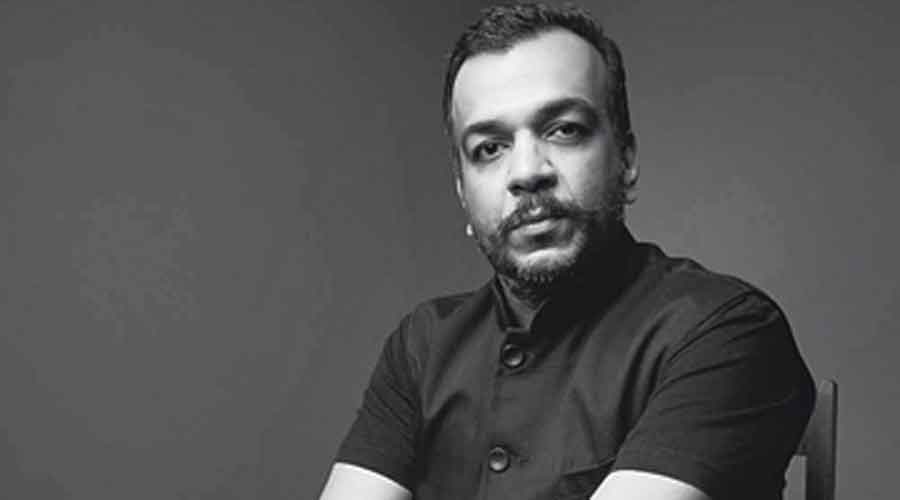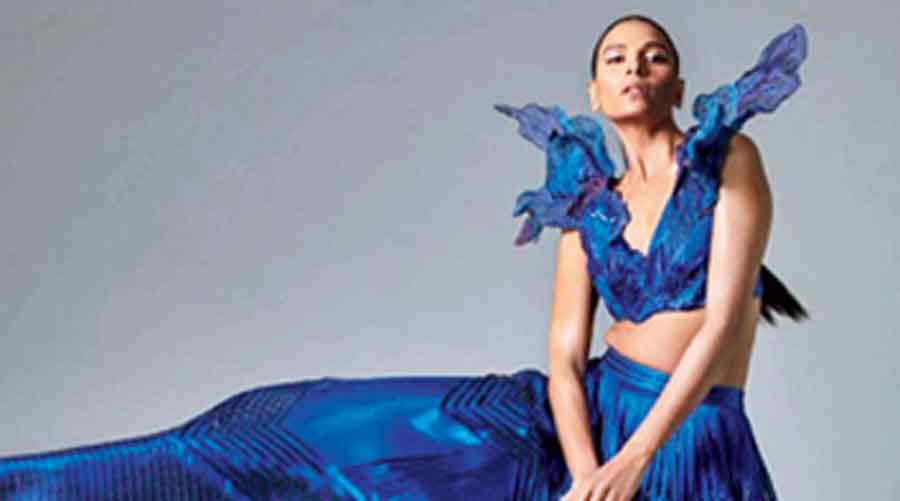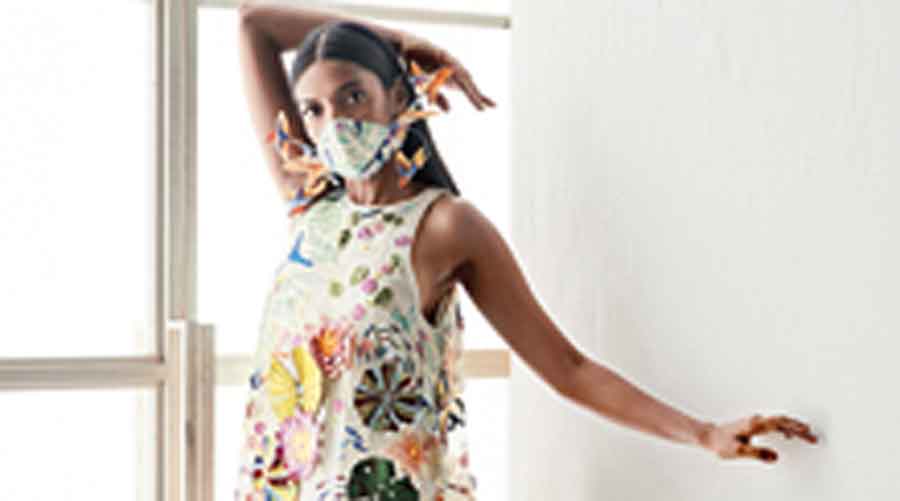One is a couturier who has shone bright internationally year after year as he took Indian crafts to newer shores, while another is a designer known for his modern sense of aesthetics — we just learnt how much he disliked the word “futuristic”! Meanwhile the third is a Wharton business grad who took bespoke labels online with a foresight in e-commerce. Together, they discussed all things fashion and business and the convergence of the two in order to be able to script a success story. Rahul Mishra, Amit Aggarwal and Devangi Parekh came together for a recent YFLO session and a confluence of their views made for an interesting insight into the world of fashion and retail. Why did Alexander McQueen refer to Paris as unforgiving and whether we can look forward to a neo-Flapper age after Covid-19, akin to the Roaring 20s after the Spanish flu? This and much more were discussed through the following excerpts:
Rahul Mishra

Rahul Mishra Sourced by The Telegraph
Creativity vs business
Designers have always been under a lot of pressure to create because of the saying that we are as good as our last collection. But I had decided before the pandemic itself that I would do only two collections a year. I think if designers look at fashion as an art form, they will stay grounded as a true artist can never have any sense of pride in his work because in his mind, he knows how far he is from the goal he has set for himself. When that happens, you know that you have to keep working and that too in a conducive environment. In fact, I have been already sketching for my next haute couture show in January for Paris. I looked at my last collection and of course don’t want to touch that again because Paris can be very unforgiving — even Alexander McQueen had said the same about Paris! If one’s signature idea lasts too long, then the creative director of that fashion house gets replaced. Having family support is very important. But our profession is just 25 per cent of our lives — the rest is everything else in your life.

A Rahul Mishra creation Sourced by The Telegraph
Post-pandemic retail
When I returned from Paris in March after a trunk show, I quarantined myself and by the time that got over, the lockdown had started here. Except for all the bad things that have happened due to the pandemic in the world, I think I enjoyed the idleness because I have been so busy in the last two-three years. I learnt a little of film-making and French — it’s not like Emily in Paris because everyone in the last six years did speak to me in English but now, I am trying! (laughs) Collection-wise, it gave me a new narrative and I was one of the first few to showcase in May-June for the digital couture week in Paris. The UP government somehow allowed my factory to operate and we happened to be one of the first to do a show. Business-wise, I am surprised because my July-September has been better than last year and we have grown in our business. I don’t know how and why but this has happened because I can just make clothes and after that, it’s up to the customers. Ten years ago, people would not touch organza but I love it! As young, independent brides are making their own decisions, it’s helping us to grow as well. I also learnt to say no to a lot of things because time and life are also limited and a balance is needed. I have decided that I am ready only twice a year and I cannot do more than that.
Amit Aggarwal

Amit Aggarwal Sourced by The Telegraph
Challenges with his modern aesthetics
In terms of design, everyone needs the basic set of craftsmen and skill set. But every time we would get someone, they would leave after a few days because they would say that I was making them stitch plastic and rubber! The initial two years were the biggest challenge to cultivate the skill set and to change how the craftsmen adapted to this. So my challenge was to get the right kind of people in my team — who were open to adapting. We trained people, including women who were never in the trade but were happy to learn. And now, we have a team that actually gets disappointed if the next collection isn’t challenging.
My aesthetics were different from the lineage of craft and aesthetics in the country in the sense that their application was dramatically different. So people took a while to understand that these were as painstaking and time-consuming to create. But people like Devangi really believed and helped us. People now are a little less fearful of making less traditional choices and I am happy to be a small agent of that change.

Amit Aggarwal couture Sourced by The Telegraph
Lessons in 2020
I have learnt to pause and the last six months have been the most fruitful for me — not just for business but for myself too. I have had time to look around for the first time and marvel at things like the trees or even my dogs. I was always in such a rush in life and there were shows after shows and I had to constantly create and churn out like a computer. The last six months have been really nice for my own brain space and journey. It is unfortunate that we have lost a lot of people and the pandemic will continue but I have learnt that life needs to be a healthy balance.
In terms of business, I stopped overthinking after a point because you cannot count your chickens till they hatch. We are not God or the people who have designed Covid-19 so we don’t know what will happen after this and so we need to be in the moment and follow our hearts. The last two-three months have been hectic again in terms of production and orders and I don’t want the company to get back to the same rut. Everyone wants to be liberated and everyone is a little more vulnerable and aware of the size of their lives. But they are also conscious about the quality of their lives.
Devangi Parekh

Devangi Parekh Sourced by The Telegraph
Taking Aza online
I had witnessed Aza growing from the ground up and was always fascinated by it. Before business school, I returned to India from the US where I grew up, to work with my mother for two years. That was eye-opening for me as the kind of talent that India has is exceptional. The craftsmanship is unlike anywhere else in the world and the value at which we get it is unreal. I realised our Indian designers needed a global platform. I pitched the idea of a digital platform for Aza to my parents and back then, it wasn’t very common. My dad is a tech entrepreneur and he supported the idea of creating an omnichannel strategy for the brand. It was a big uphill battle initially because many designers were worried about getting copied and whether people would spend that much online. That was six years ago but since then, the country has opened up to the idea of e-commerce. Now, all the brands are scrambling to get online and it is really reassuring for us to have the kind of social media base that we do.
The possibility of a neo-Flapper age
This was the first thing that came to my mind and I was wondering if after this, consumption will move to an all-time high as there is a feeling of repression and being stuck at home. What sets in after this is a feeling of carpe diem. I don’t know for sure but there are two sides of the coin. For the sake of the environment, I hope we don’t misuse our resources but for the sake of business, it would be nice if the trend of spending continues.
That being said, I would like to clarify that throughout the lockdown, we have seen e-commerce sales go up. Even for weddings and close families, they are wearing what they have wanted to — so it is still happening but it’s been a shift in what is being bought. There has been a shift towards classic styles that can be reworn and repeated. So if you recognise what people are buying and work with that, then sales are going up.

Shefali Rawat Agarwal Sourced by The Telegraph
The fashion industry, along with other businesses, has faced a lot of setbacks this year. It was interesting to know how Rahul and Amit have done their relevant bit to help the industry sustain. Devangi gave us a positive insight into how the e-commerce platform has now strengthened and taken off to the next level
— Shefali Rawat Agarwal, chairperson, YFLO










